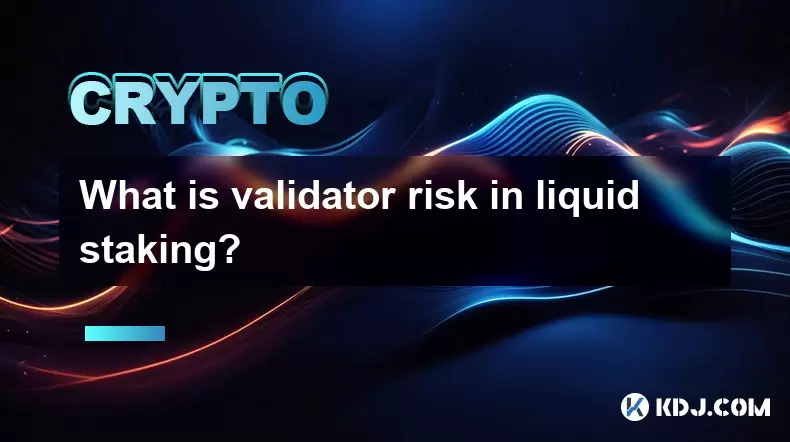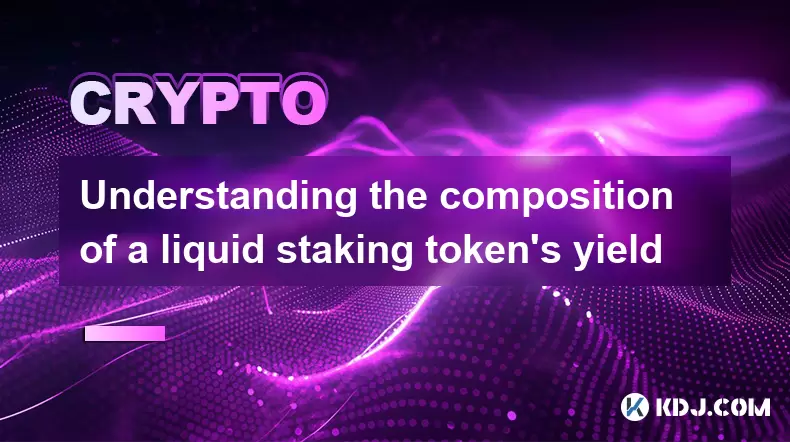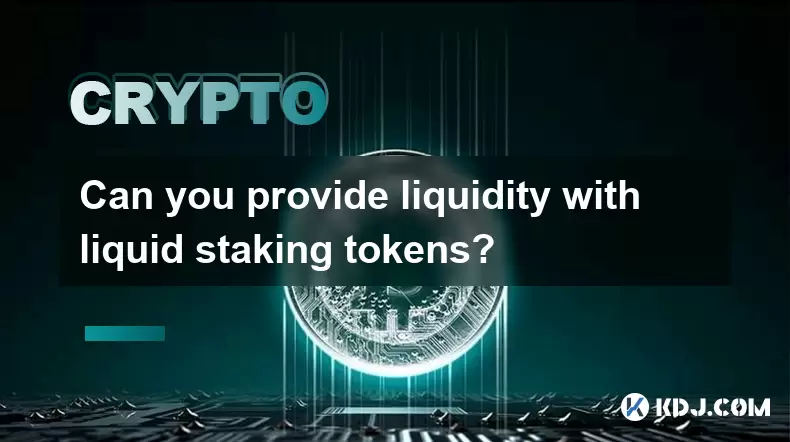-
 bitcoin
bitcoin $87959.907984 USD
1.34% -
 ethereum
ethereum $2920.497338 USD
3.04% -
 tether
tether $0.999775 USD
0.00% -
 xrp
xrp $2.237324 USD
8.12% -
 bnb
bnb $860.243768 USD
0.90% -
 solana
solana $138.089498 USD
5.43% -
 usd-coin
usd-coin $0.999807 USD
0.01% -
 tron
tron $0.272801 USD
-1.53% -
 dogecoin
dogecoin $0.150904 USD
2.96% -
 cardano
cardano $0.421635 USD
1.97% -
 hyperliquid
hyperliquid $32.152445 USD
2.23% -
 bitcoin-cash
bitcoin-cash $533.301069 USD
-1.94% -
 chainlink
chainlink $12.953417 USD
2.68% -
 unus-sed-leo
unus-sed-leo $9.535951 USD
0.73% -
 zcash
zcash $521.483386 USD
-2.87%
What is validator risk in liquid staking?
Validator risk in liquid staking can lead to financial penalties, slashing, or downtime, directly impacting users' tokenized assets like stETH or rETH.
Jul 23, 2025 at 06:07 pm

Understanding Validator Risk in Liquid Staking
Validator risk in the context of liquid staking refers to the potential for financial loss or penalty that a validator may face due to misbehavior, technical failures, or network-related issues. In liquid staking, users deposit assets (such as ETH) into a protocol, which then stakes them on their behalf via validators. In return, users receive a tokenized representation of their staked assets—like stETH or rETH—which can be used across decentralized finance (DeFi). However, the performance and reliability of the underlying validators are critical to maintaining the value and security of these liquid tokens.
Validators are responsible for proposing and attesting to blocks in a proof-of-stake (PoS) blockchain. If they fail to perform their duties correctly—either by being offline, signing conflicting blocks, or acting maliciously—they can be slashed, meaning a portion or all of their staked assets may be forfeited. This validator risk directly affects the users who deposited their assets into the liquid staking protocol, as the loss of stake translates into a reduced value of their liquid staking derivatives.
How Validator Misbehavior Impacts Users
In liquid staking, the staked assets are pooled and delegated to one or more validators. If any of those validators behave improperly, the consequences are shared among all token holders. This shared risk model is a core concern for users who may not be aware of the technicalities of the underlying validator infrastructure.
Validators can be penalized in several ways:
- Downtime penalties: If a validator is offline or fails to participate in consensus, they lose a small percentage of their stake.
- Slashing penalties: If a validator signs two conflicting blocks or votes on two different chains, they are considered to be acting maliciously, and a significant portion of their stake is slashed.
The tokenized assets issued by the liquid staking protocol reflect the total staked amount minus any penalties. Therefore, if validators underperform or are slashed, the value per token decreases, directly impacting the users' holdings.
Infrastructure and Operational Risks for Validators
Validators must maintain a robust and secure infrastructure to ensure high uptime and avoid penalties. However, several operational risks can compromise their performance:
- Network latency: A validator node must communicate quickly with the rest of the network. Delays can lead to missed attestations or blocks.
- Hardware failures: Server crashes or storage issues can cause a validator to go offline unexpectedly.
- Software bugs: Errors in the consensus client or staking software can lead to incorrect behavior, triggering penalties.
Liquid staking protocols often distribute user deposits across multiple validators to mitigate this risk. However, if a single validator node experiences issues, the impact is still felt across the pool. Some protocols implement insurance funds or reserve mechanisms to cushion users from losses caused by validator failures.
Centralization Risks in Validator Selection
A major concern in liquid staking is the centralization of validators. Many liquid staking platforms use a limited number of validators to manage staking efficiently. While this improves operational control, it also introduces centralization risk, where the failure or compromise of a single validator can affect a large portion of the staked assets.
This concentration of power increases the potential for systemic failure. For instance, if a single validator is compromised or misbehaves, it can lead to significant slashing across the entire pool. Furthermore, if a small number of validators dominate the network, it could undermine the decentralization principles of the blockchain itself.
Users should evaluate the diversity and transparency of validator operators used by a liquid staking protocol. Protocols that allow users to choose or audit validators tend to offer better risk distribution.
Smart Contract and Protocol Risks
While validator risk primarily concerns the behavior of node operators, liquid staking protocols also introduce smart contract risks that can indirectly affect validator performance. Bugs in the protocol's code can lead to incorrect delegation, slashing, or mismanagement of staked assets.
Additionally, some liquid staking protocols use third-party services or outsourced validator management, which can further complicate the trust model. If the smart contract does not properly handle validator selection, slashing events, or reward distribution, users may suffer losses even if the validators themselves are performing correctly.
To mitigate this, users should look for protocols that have undergone multiple audits, offer open-source code, and provide transparent reporting on validator performance and penalties.
FAQs
Q: Can I choose my validator in liquid staking?Some protocols allow users to select or delegate to specific validators, while others automatically distribute deposits across a set of validators. Choosing your validator can provide more control but requires technical knowledge.
Q: How do slashing penalties affect my liquid staking tokens?Slashing penalties reduce the total staked balance of the validator pool. This reduction lowers the value of the tokenized assets issued by the protocol, such as stETH or rETH.
Q: Are all validators in a liquid staking pool treated equally?No, some validators may perform better than others. Protocols may rotate or reassign stakes based on performance, but poor-performing validators still impact the overall pool.
Q: Can a validator be removed from a liquid staking protocol if they underperform?Yes, many protocols have mechanisms to monitor and replace underperforming or penalized validators. However, this process may not be instantaneous, and losses may still occur before removal.
Disclaimer:info@kdj.com
The information provided is not trading advice. kdj.com does not assume any responsibility for any investments made based on the information provided in this article. Cryptocurrencies are highly volatile and it is highly recommended that you invest with caution after thorough research!
If you believe that the content used on this website infringes your copyright, please contact us immediately (info@kdj.com) and we will delete it promptly.
- Beyond the Forecast: Is Carol Kirkwood's Departure a Whisper of BBC's Lingering 'Token Woman' Problem?
- 2026-02-01 16:25:01
- Bitcoin Plunges Amidst Liquidity Worries: A Record Low for Crypto Sentiment?
- 2026-02-01 16:25:01
- Pi Network's Mainnet: A Crypto Milestone Unveils a Complex Market Picture
- 2026-02-01 16:20:02
- Top Watch: Emerging Cryptocurrencies Charting New Territories in 2026
- 2026-02-01 16:15:01
- Wall Street Whales, DeFi Dynamos, and the Cross-Asset Surge: Decoding BTC, ETH, and Hyperliquid's Latest Plays
- 2026-02-01 13:00:02
- Dogecoin's Identity Crisis: From Meme Darling to Digital Identity Quandary
- 2026-02-01 16:15:01
Related knowledge

Understanding the composition of a liquid staking token's yield
Jul 20,2025 at 09:07am
What Is a Liquid Staking Token?A liquid staking token is a representative asset issued to users who stake their native cryptocurrency on a proof-of-st...

Is it better to stake directly or use a liquid staking service?
Jul 22,2025 at 08:21pm
Understanding the Basics of StakingStaking in the context of blockchain and cryptocurrency refers to the process of locking up digital assets to suppo...

What to do during an LST depeg event
Jul 20,2025 at 04:57pm
Understanding LST Depeg EventsAn LST (Liquid Staking Token) depeg event occurs when the token, which is typically pegged to the value of the underlyin...

How to find new liquid staking projects
Jul 30,2025 at 01:14pm
Understanding Liquid Staking and Its ImportanceLiquid staking is a mechanism that allows users to stake their cryptocurrency assets while still mainta...

Can you provide liquidity with liquid staking tokens?
Jul 22,2025 at 10:22am
Understanding Liquid Staking TokensLiquid staking tokens (LSTs) are derivative tokens that represent staked assets on a proof-of-stake (PoS) blockchai...

What are the best wallets for storing LSTs?
Jul 21,2025 at 03:14pm
Understanding LSTs and the Need for Secure StorageLSTs, or Liquid Staking Tokens, are derivative tokens representing staked assets on a blockchain. Wh...

Understanding the composition of a liquid staking token's yield
Jul 20,2025 at 09:07am
What Is a Liquid Staking Token?A liquid staking token is a representative asset issued to users who stake their native cryptocurrency on a proof-of-st...

Is it better to stake directly or use a liquid staking service?
Jul 22,2025 at 08:21pm
Understanding the Basics of StakingStaking in the context of blockchain and cryptocurrency refers to the process of locking up digital assets to suppo...

What to do during an LST depeg event
Jul 20,2025 at 04:57pm
Understanding LST Depeg EventsAn LST (Liquid Staking Token) depeg event occurs when the token, which is typically pegged to the value of the underlyin...

How to find new liquid staking projects
Jul 30,2025 at 01:14pm
Understanding Liquid Staking and Its ImportanceLiquid staking is a mechanism that allows users to stake their cryptocurrency assets while still mainta...

Can you provide liquidity with liquid staking tokens?
Jul 22,2025 at 10:22am
Understanding Liquid Staking TokensLiquid staking tokens (LSTs) are derivative tokens that represent staked assets on a proof-of-stake (PoS) blockchai...

What are the best wallets for storing LSTs?
Jul 21,2025 at 03:14pm
Understanding LSTs and the Need for Secure StorageLSTs, or Liquid Staking Tokens, are derivative tokens representing staked assets on a blockchain. Wh...
See all articles
























![[Audio stories] Streamer Became a Billionaire Overnight After Buying One Junk Coin [Audio stories] Streamer Became a Billionaire Overnight After Buying One Junk Coin](/uploads/2026/02/01/cryptocurrencies-news/videos/origin_697eaa9a495ed_image_500_375.webp)

















































